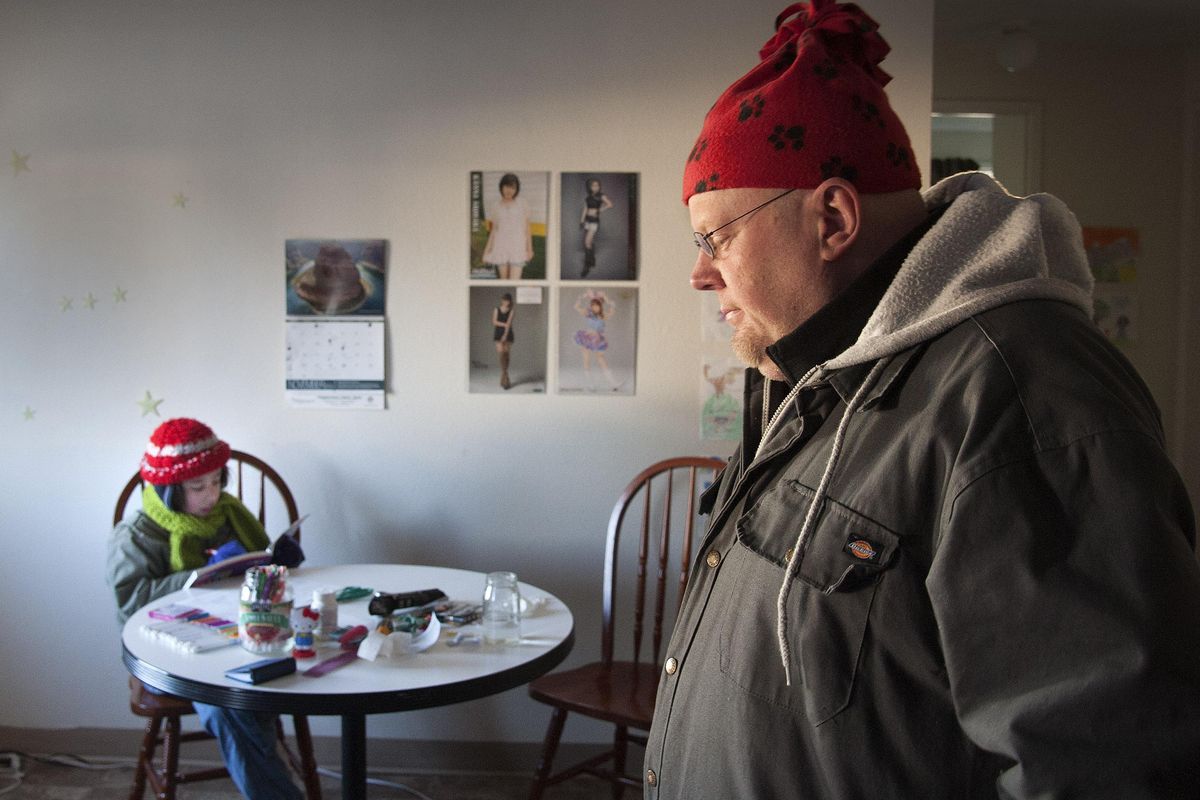Getting by without power hits the poor harder, resident says

Matthew Watters understands that the power outages from Tuesday’s windstorm are affecting nearly everyone in Spokane.
But Watters, who lives in a Housing and Urban Development subsidized apartment complex with his 9-year-old son, thinks the outages disproportionately impact the poor and he wants Avista to do something about it.
“It’s just wrong. A lot of people are suffering here,” he said. “There are a lot of poor and sick people that live in these places. That’s why they live here.”
Jessie Wuerst, an Avista Utilities spokeswoman, said the company is aware that the biggest impact is often on those who “can least afford it.” However, the socioeconomic status of neighborhoods isn’t taken into account when restoring power.
“The manner in which power is brought on in any kind of an emergency situation is that you find those areas that bring on the biggest number of customers first,” Wuerst said.
While Watters doesn’t think anyone is directly targeting the poor, he thinks the ultimate effect is one of discrimination.
“We don’t really have resources to go anywhere or do anything,” he said.
Watters lives on $350 a month, he said. Buying candles and flashlights stretches his already meager budget. He lost about $40 worth of food when he lost power and is spending more money than usual on gas driving in search of warmth.
“For a middle class person this is an inconvenience,” he said. “I’m a single parent with a 9-year-old child. We can’t afford to spend the night in a hotel or buy flashlights and candles.”
His small apartment is as cold as a meat locker. Watters and his son Quercus spend their days at the library. They’ve considered going to the Union Gospel Mission or House of Charity, but Watters said he doesn’t feel comfortable taking his son there.
Quercus attends nearby Grant Elementary, which has been closed since Tuesday. He misses school.
“It’s terrible,” Quercus said. “After a while just eating cold food all the time kind of makes you start shivering and it’s just terrible.”
Watters said his neighbors told him that during the ice storm of 1996 their building was one of the last to get power. What makes it worse, he said, is that houses across the street have power.
“I really feel like the response to this natural disaster isn’t sympathetic to the poor,” Watters said.
Wuerst understands Watters’ frustration. In an effort to ease the suffering of lower-income citizens, she said Avista has donated $50,000 to local aid agencies.
“It’s terribly frustrating. We understand that completely,” Wuerst said. “But this is a matter of the public good and part of our obligation to serve.”
Although Avista doesn’t consider an area’s household income when restoring power, Wuerst said the company does consider medically vulnerable populations, like the elderly. Avista has reached out to 75 care facilities around Spokane. The goal, she said, is to get those facilities powered by Saturday.
According to Washington law, nursing homes must have an emergency plan that includes backups for food, water, first-aid supplies and emergency lighting, such as flashlights, said Chris Wright, a spokesman for the Washington state Department of Social and Health Services. There is no requirement for these facilities to have a generator, but they must be prepared to relocate residents if the facility is unable to meet their needs.
Touchmark, an elder care facility on the South Hill, lost power Tuesday night. While individual rooms lost power, the common areas are heated using two backup generators, said Executive Director Jeffrey Bair.
Friday afternoon Avista was installing another, larger generator for Touchmark, Wuerst said.
“They’re really trying to keep us as comfortable as possible,” said resident Joanne McCann.
Ryan Bishop, the co-owner of Legacy Gardens of Spokane Adult Family Home, said the facility has a backup generator and propane. The five residents who live there are fine, he said.
“We’ve been really blessed with everything,” he said. “The only thing we’ve had to go off-site for is laundry.”
Meanwhile Watters and Quercus said they would wait it out at the library.
“We’re poor people,” he said. “We need help now.”